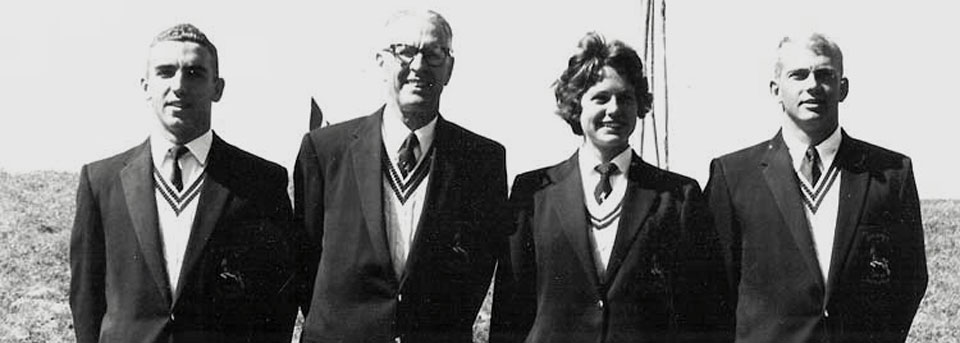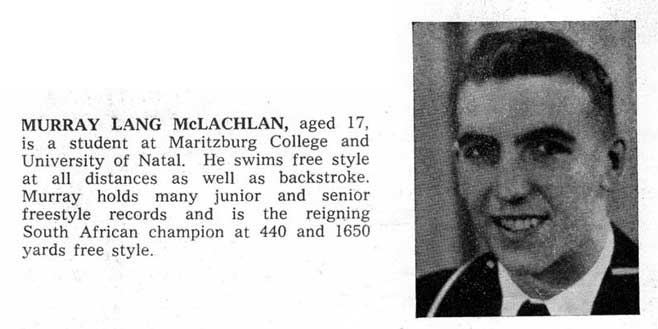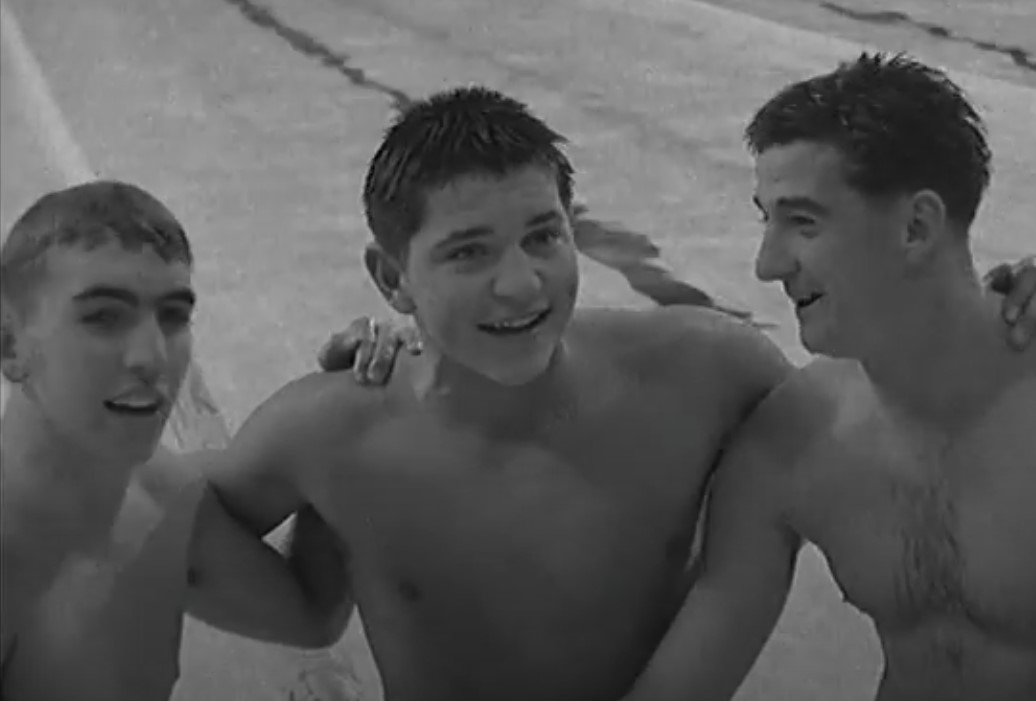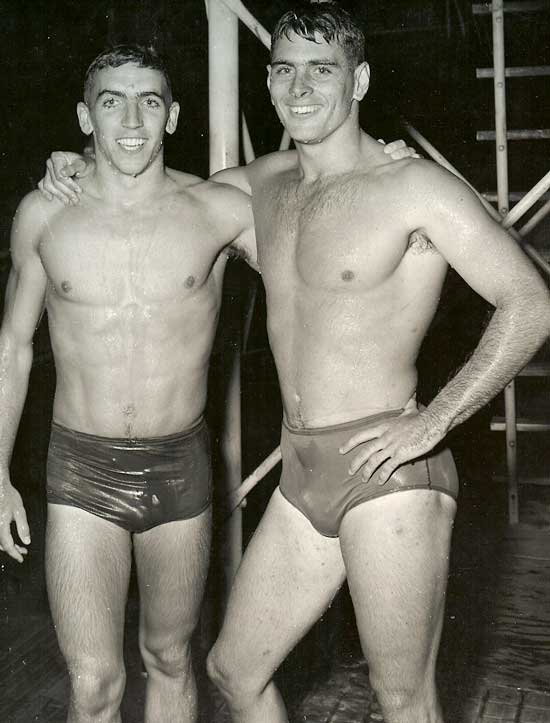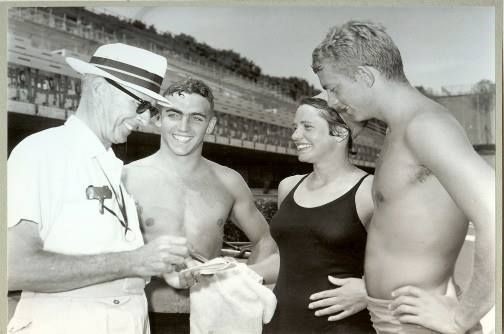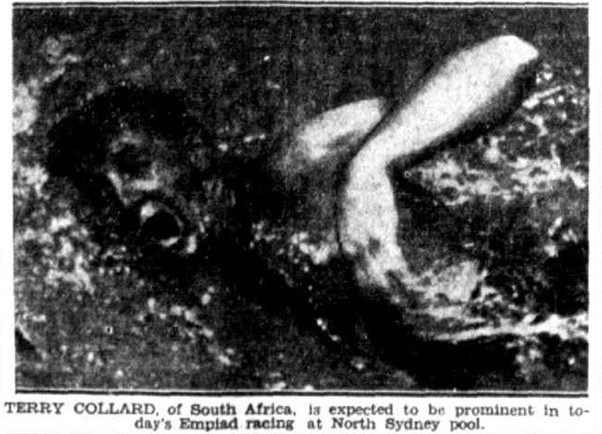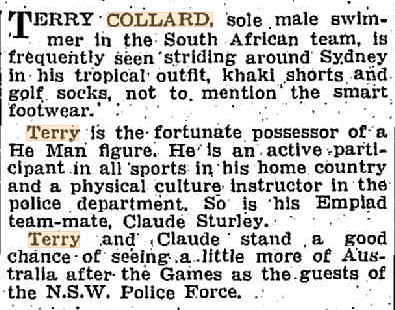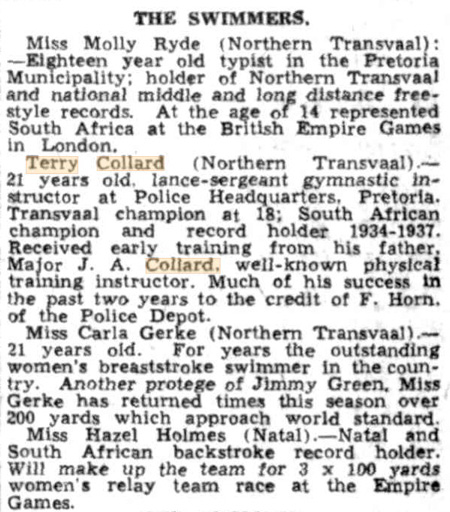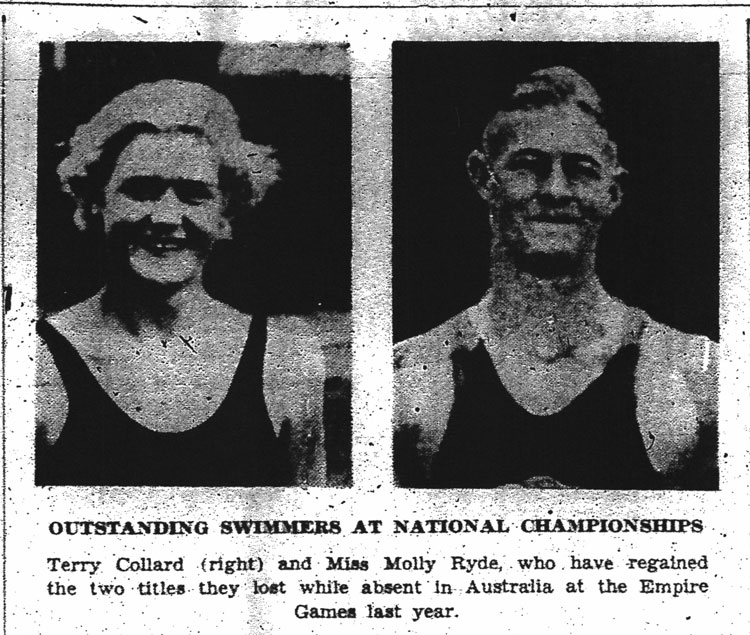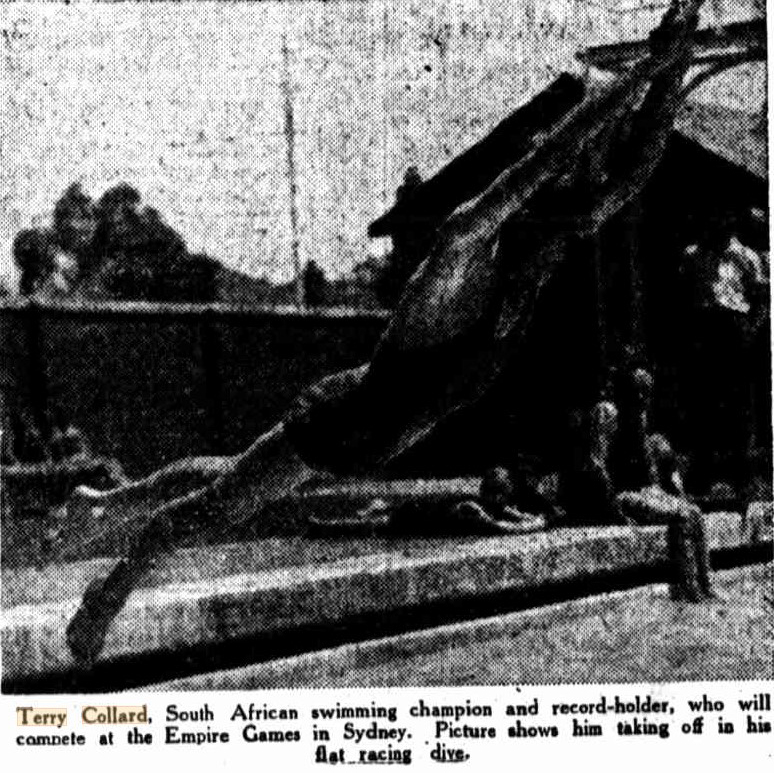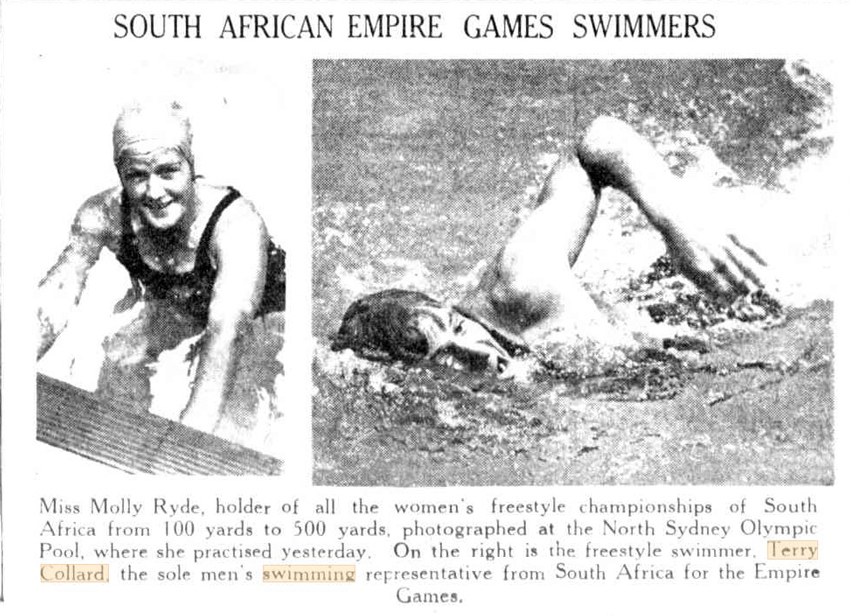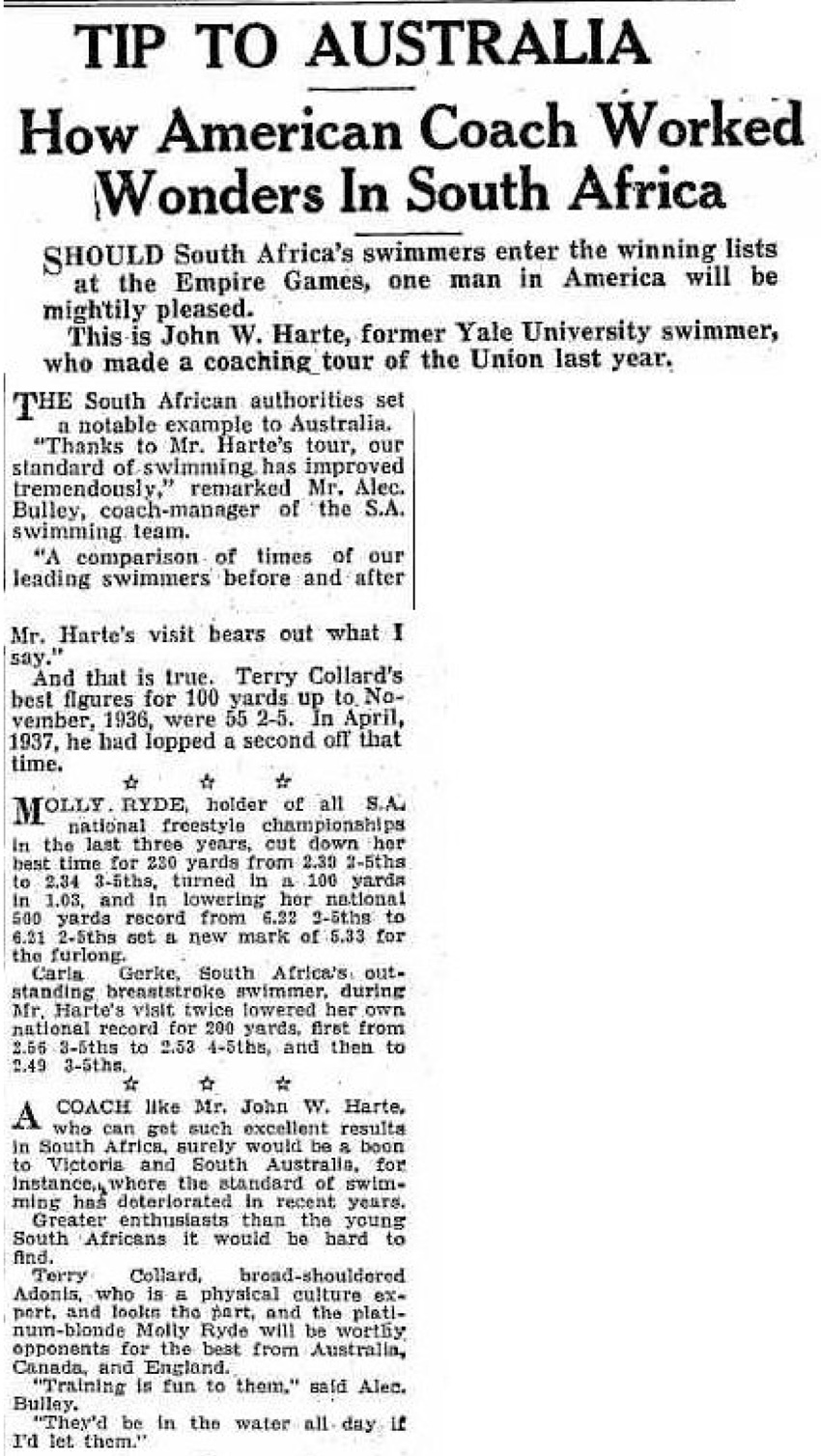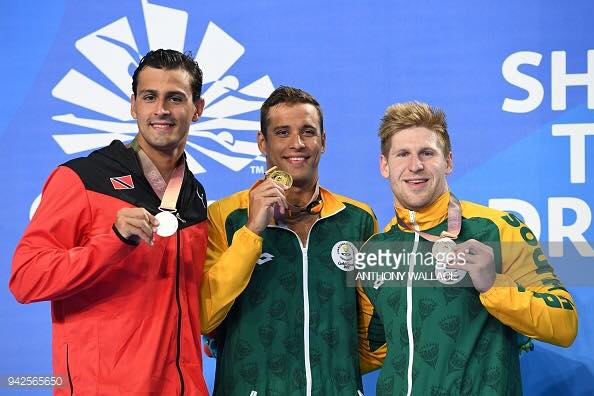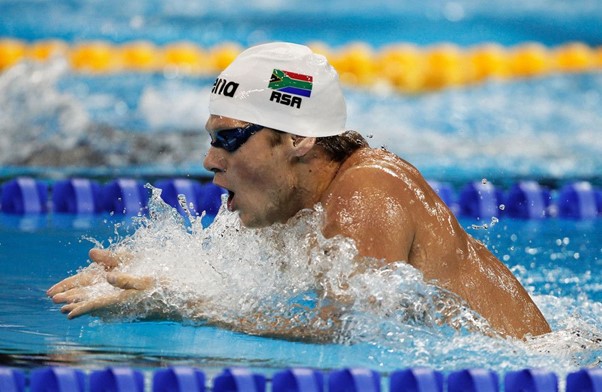Posted in Champions.
Sébastien Rousseau
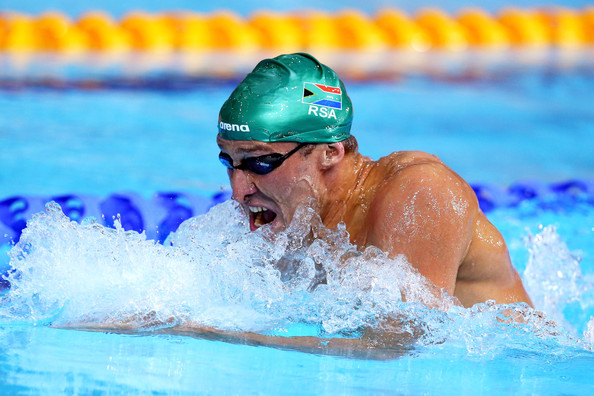
Sebastien Rousseau was born 10 September 1990 in Sandton, but he attended SACS and completed matric at Abbotts College in Cape Town, where he swam with coach Kalory von Törrös at the Vineyard Swimming Club. He won a scholarship to swim for the University of Florida.
In 2010 at the Commonwealth Games in India, Sebastien was a member of the South African medley relay team that won a silver medal, although he only swam in the heat, while Chad le Clos took his place to complete the butterfly leg in the final. Similarly, in the 4x200 freestyle relay which won bronze, Sebastien only swam in the heat.
At the 2014 Commonwealth Games, he won individual bronze medals in the 400m individual medley and 200m butterfly. He also won bronze in the 4 × 200 m freestyle relay and 4 × 100 m medley relay events.
Seb began swimming at age 9 and represented South Africa in the 2008, 2012 and 2016 Olympics competitions.
His swimming career also included many other international competitions, including World Championships, where he finaled four times. To this day, Sebastien still holds the South African record in the 400-meter Individual Medley.
In 2010, he began his NCAA career at the University of Florida. During his time there, he helped their 4 x 200 freestyle relay win two first-place finishes at the NCAA Championships.
After the Rio Olympics in 2016, he retired from his athletic career and joined the workforce in Chicago.

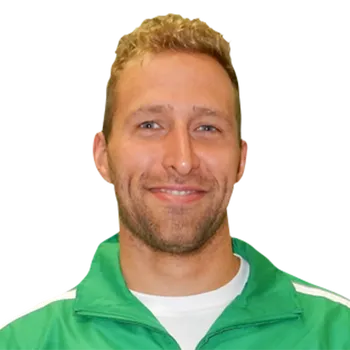
Personal best times
| Event |
Course |
Time |
Pts. |
Date |
City (Nation) |
Meet |
| 50m Freestyle |
50m |
24.60 |
614 |
11 Jun 2008 |
Barcelona (ESP) |
Mare Nostrum |
| 100m Freestyle |
50m |
52.55 |
709 |
14 Jun 2008 |
Canet-en-Roussillon (FRA) |
Mare Nostrum |
| 100m Freestyle |
25m |
50.55 |
697 |
4 Sep 2008 |
Germiston |
South African Short Course ... |
| 200m Freestyle |
50m |
1:49.36 |
811 |
14 Apr 2009 |
Durban |
South African Championships |
| 200m Freestyle |
25m |
1:47.06 |
799 |
7 Aug 2014 |
Durban |
South African Short Course ... |
| 400m Freestyle |
50m |
3:59.18 |
778 |
6 Jun 2008 |
Roma (ITA) |
46. Trofeo Sette Colli |
| 400m Freestyle |
25m |
4:01.51 |
678 |
8 Sep 2005 |
Pietermaritzburg |
South African Short Course ... |
| 800m Freestyle |
50m |
8:59.31 |
589 |
18 Mar 2005 |
Pietermaritzburg |
South African Age Group ... |
| 800m Freestyle |
25m |
8:19.11 |
687 |
8 Sep 2005 |
Pietermaritzburg |
South African Short Course ... |
| 1500m Freestyle |
50m |
17:04.84 |
613 |
18 Mar 2005 |
Pietermaritzburg |
South African Age Group ... |
| 1500m Freestyle |
25m |
15:56.21 |
694 |
8 Sep 2005 |
Pietermaritzburg |
South African Short Course ... |
| 50m Backstroke |
25m |
26.12 |
606 |
8 Aug 2014 |
Durban |
South African Short Course ... |
| 100m Backstroke |
50m |
55.33 |
811 |
29 Jul 2014 |
Glasgow (GBR) |
XX Commonwealth Games |
| 200m Backstroke |
50m |
2:02.82 |
756 |
12 Jul 2015 |
Orlando (USA) |
Southern Zone South Sectional |
| 50m Butterfly |
50m |
25.64 |
655 |
6 Jun 2008 |
Roma (ITA) |
46. Trofeo Sette Colli |
| 50m Butterfly |
25m |
25.21 |
642 |
19 Oct 2007 |
Durban |
FINA: World Cup No 1 - 2007 Series |
| 100m Butterfly |
50m |
53.22 |
802 |
14 Apr 2009 |
Durban |
South African Championships |
| 100m Butterfly |
25m |
51.42 |
802 |
3 Dec 2014 |
Doha (QAT) |
FINA: 12th World Short Course ... |
| 200m Butterfly |
50m |
1:54.51 |
894 |
28 Jul 2009 |
Rome (ITA) |
FINA: 13th World Championships |
| 200m Butterfly |
25m |
1:52.97 |
846 |
7 Dec 2014 |
Doha (QAT) |
FINA: 12th World Short Course ... |
| 100m Medley |
25m |
53.55 |
779 |
6 Dec 2014 |
Doha (QAT) |
FINA: 12th World Short Course ... |
| 200m Medley |
50m |
1:59.55 |
867 |
1 Dec 2011 |
Atlanta (USA) |
US Winter National Championships |
| 200m Medley |
25m |
2:00.98 |
744 |
20 Oct 2007 |
Durban |
FINA: World Cup No 1 - 2007 Series |
| 400m Medley |
50m |
4:13.09 |
879 |
25 Jul 2014 |
Glasgow (GBR) |
XX Commonwealth Games |
| 400m Medley |
25m |
4:02.00 |
913 |
4 Dec 2014 |
Doha (QAT) |
FINA: 12th World Short Course ... |
| 50m Freestyle Lap |
25m |
25.09 |
- |
8 Sep 2005 |
Pietermaritzburg |
South African Short Course ... |
| 100m Freestyle Lap |
50m |
50.43 |
- |
15 Aug 2011 |
Shenzhen (CHN) |
XXVI Universiade |
| 100m Freestyle Lap |
25m |
48.21 |
- |
7 Aug 2014 |
Durban |
South African Short Course ... |
| 200m Freestyle Lap |
50m |
1:47.03 |
- |
27 Jul 2014 |
Glasgow (GBR) |
XX Commonwealth Games |
| 200m Freestyle Lap |
25m |
1:43.96 |
- |
4 Dec 2014 |
Doha (QAT) |
FINA: 12th World Short Course ... |
| 100m Butterfly Lap |
50m |
54.11 |
- |
11 Jul 2015 |
Orlando (USA) |
Southern Zone South Sectional |
| 100m Butterfly Lap |
25m |
52.76 |
- |
13 Apr 2008 |
Manchester (GBR) |
FINA: 9th World Short Course ... |
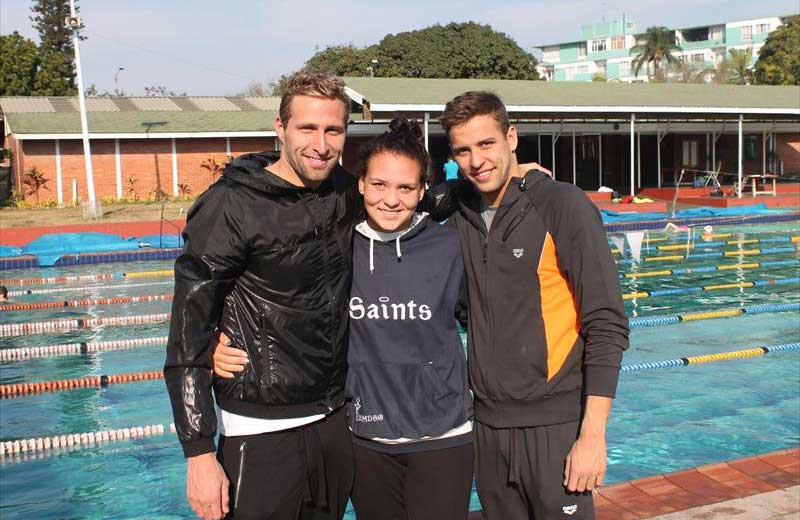
5 August 2014 - Sebastian Rousseau, Rene Warnes and Chad le Clos at Seagulls SC.
During his time in South Africa, before he returns to complete his final semester in sports management in Florida, Sebastien Rousseau trained with the Seagulls Swimming Club.
At the Games he competed in and won bronze medals for the 200m individual butterfly, the 400m individual medley, the 4x200m freestyle relay and the 4x100m medley relay.
“The Seagulls have so many good swimmers in their team so they are great to train with when I am down in South Africa,” said Sebastien.
His short term goal is to compete in the World Short Course in December this year and is set to improve on his current times by reacting faster to how his competitors swim.
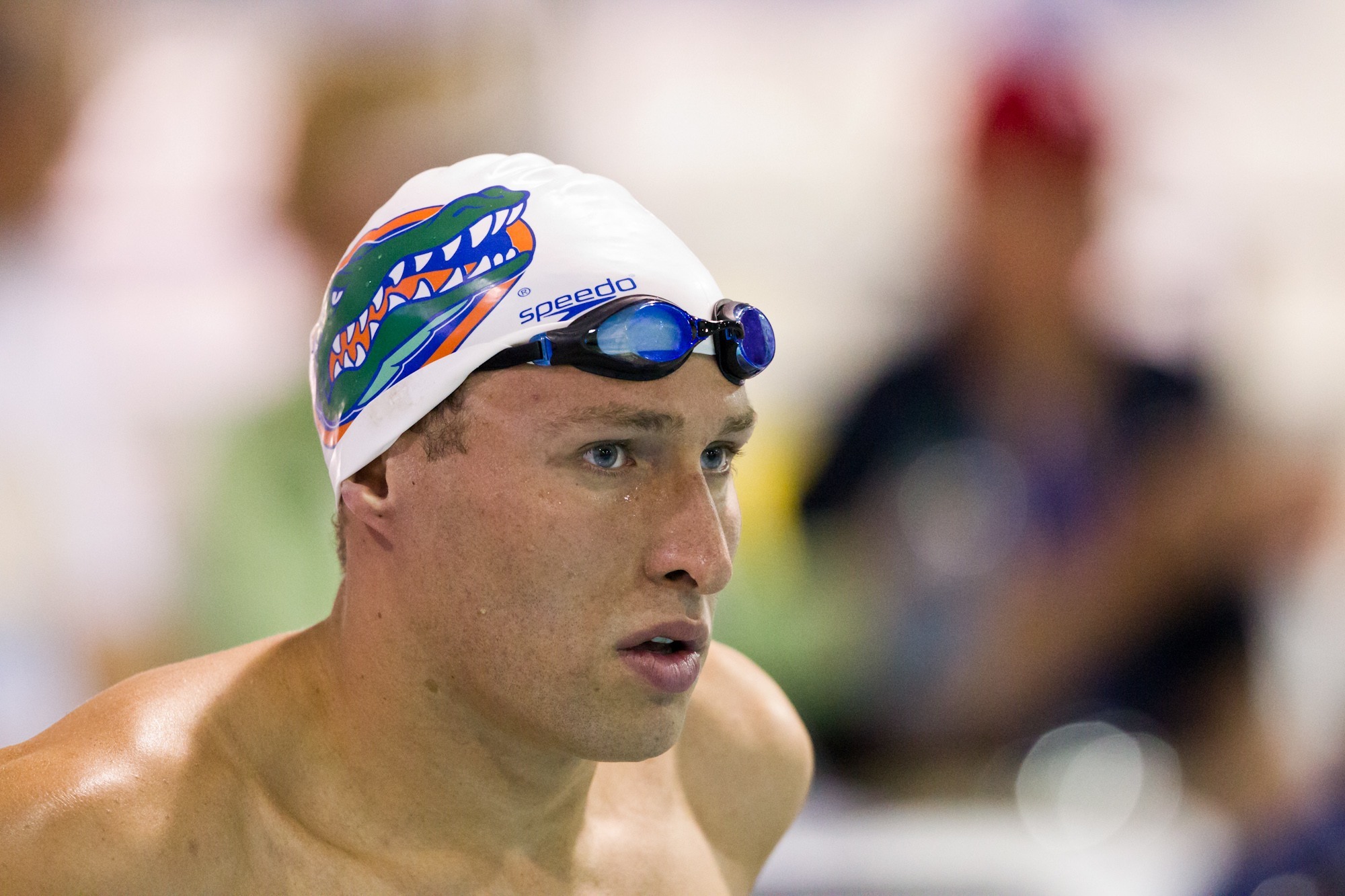
National/International Competition: Competed in the 2012 London Olympics as part of South Africa’s 800 free relay team that finished eighth… Is a two-time Olympic finalist and two-time World Championship finalist … He Owns South Africa’s 400 IM record of 4:11.11 … Held the South African 200-meter fly National Record (1:54.51) from when he competed at the 2009 FINA World Championships, and a part of the Nation’s record-holding 800 Free Relay Team that competed at the 2009 World Championships in Rome, Italy… Named the Male High Point of the 2013 US Open after going a perfect four-for-four in the 200 fly, 200 IM, 400 IM and 200 free … He Swam at the 2011 FINA World Championships, narrowly missing the finals of the 200 fly as he finished 17th in 1:57.15 and part of the 800-meter freestyle relay team from south Africa that finished 12th… At the 2012 Durban South Africa National Aquatic Championships, finished third in the 200 free (1:48.69), second in the 200 fly (1:57.88), third in the 200 IM (2:00.37) and fourth in the 400 IM (4:17.83)… 2011 Telkom South Africa National Championships 200 fly (1:57.95) silver medalist… Won silver on South Africa’s 400-meter medley relay squad at the 2010 Commonwealth Games in New Delhi, India… He also won a bronze on his country’s 800-meter free relay team at the same event… Swam personal-best times at the 2010 Commonwealth Games in the 200 fly (1:57.45), 200 free (1:51.08), 200 IM (2:02.33) and 400 IM (4.29.07)… Times in the 200 fly (second) and 200 IM (eighth) are top-10 in school history… Competed at the 2010 Pan Pacific Championships in Irvine, Calif., finishing 14th in the 200-meter fly (1:58.52) and 400-meter IM (4:29.07), as well as 17th in the 200-meter IM (2:03.98) and 35th in the 100-meter fly (54.88)… Competed at the 2008 Olympics as a member of the 800-meter free relay team that came in eighth.
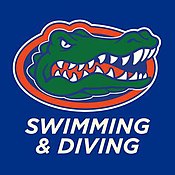

14-time All-American Selection
2013-14:
Respected by his coaches and peers for leading by example and called one of the most consistent trainers to compete at Florida … Named the SEC Swimmer of the Meet and earned Florida’s 12th Commissioner’s Trophy after scoring the most points at the 2014 SEC Championships … Registered a maximum three individual SEC titles after entering the meet without winning an individual title in his three previous seasons … Set the SEC record in the 200 butterfly in a time of 1:41.07 … Also touched first in the 200 freestyle and 200 individual medley … Part of UF’s school record setting and SEC Champion 800 free relay (6:13.03) … At NCAAs, finished eighth in the 200 fly (1:44.34) and ninth in the 400 IM (3:40.77) … Helped UF’s 800 free relay to a silver medal in a time of 6:14.74 … Picked up his first career 200 free relay All-American honor as part of a fifth place finish (1:16.98) … Part of UF’s school record 200 free relay team in prelims (1:16.52) … Won eleven individual events and competed on ten first place relays during dual meet and invitational season prior to SEC Championships … Swept four events at the 2013 U.S. Open and earned the Male High Point award for his performance … Collected SEC Athlete of the Week honors for the fourth time in his career for his performance versus Alabama after taking the 200 fly in a time of 1:45.71 … Named to 2014 SEC Academic Honor Roll.
2012-13: 2013 SEC Academic Honor Roll Selection… Earned his second NCAA Championship with the 800 free relay that finished in a school record 6:13.27… Totaled four All-America honors, with a fourth place finish in the 200 fly touching the wall in a personal-best 1:41.52 and posted another personal-best time of 4:15.31 to take eighth in the 500 free… Swam as part of the SEC Champion 800 free relay that combined for the third-best time in school history of 6:14.76...Recorded two second place finishes at the SEC Championships, as he took second in the 200 fly (1:42.18) and was second in the 200 free (1:34.02), also finished fourth in the 200 IM (1:43.58) setting another personal-best to earn four All-SEC honors...Swept the butterfly events as he took first in the 100 (48.74) and 200 fly (1:45.34) against Tennessee...Took second in the 200 free (1:37.91) and third in the 200 IM (1:49.70) against Auburn...Won all three individual events, 400 IM (3:42.91), 500 free (4:17.53) and 200 fly (1:43.45) at the SMU Classic to earn his third SEC Male Swimmer of the Week honor...Claimed the win in the 400 IM (3:41.69) and the 200 IM (1:44.02) setting a meet records in both, finished second in the 200 fly (1:43.01) and 11th in the 200 back (1:45.58) at the Ohio State Invitational, earned SEC Male Swimmer of the Week for the second time of the season...Won the 200 fly (1:47.13) and finished second in the 200 back (1:49.00) against in-state rival Florida State...Finished first in the 200 free posting a time of 1:37.39 and won the 100 breast with a time of 56.77, and added a second place finish in the 100 free (45.37) against Texas A&M...Grabbed a win in the 200 free stopping the clock in 1:37.72 and finished second in the 100 fly in 49.66 at South Carolina...Won a trio of events against Georgia, taking first in the 200 fly (1:45.73), 200 back (1:47.99) and 200 IM (1:48.45) to earn SEC Male Swimmer of the Week...Took first in the 500 free (4:25.47), 400 IM (3:51.15) and 200 fly (1:46.41), took second in the 200 back (1:47.43) and finished third in the 200 IM (1:50.37) and the 100 back (50.81) at the All-Florida Invitational… Helped lead the Gators to their 13th consecutive top-10 finish at the NCAA Championships, all under Head Coach Gregg Troy.
2011-12: Redshirted for the 2011-12 year and did not see any competition.
2010-11: Earned four All-America honors at the 2011 NCAA Championships, bringing his career total to six… Won his first NCAA Championship as part of the 800 free relay team, and finished seventh in both the 200 free and fly competitions. His 1:34.19 in the 200 fly at the NCAA Championships, is a personal-best time… Earned two All-SEC honors, bringing his career total to four… Broke both the SEC and school record as part of the 800 free relay squad at the 2011 conference championships… Took home bronze at the SEC Championships in the 200 fly, with a 1:42.80 mark that ranks fourth in school history, and also finished fourth in the 200 IM, touching in 1:44.50… Captured the 200 fly title against SEC foe Auburn, touching in 1:46.04… Swam the second leg of the first-place 800 FR at the SMU Classic, while also finishing third in the 400 IM (season-best, 3:52.98) and fourth in both the 200 fly and 500 free… Won the 400 IM with a 3:53.92 NCAA qualifying time against Georgia Tech… Against rival Florida State, won both the 200 fly and IM, and finished second in the 100 fly… Clinched dual victories against LSU in both the 200 (1:38.94) and 500 free (4:31.81), while also swimming the third leg of the first-place 400 MR… Helped lead head coach Gregg Troy to his 11th consecutive top-10 finish at NCAA’s.
2009-10: Earned the first two All-America honors of his career at the 2010 NCAA Championships by placing sixth in the 200-yard fly and 12th in the 400-yard IM… A two-time All-SEC selection as a member of the 800 free relay and 400 medley relay UF squads… A three-time freshman All-SEC selection as the highest freshman finisher in the 400 IM, 200 IM and 200 fly after finishing third in the 400 IM and fourth in the 200 IM and fly… Placed second in the 200 fly vs. Auburn (1:47.62)… Won the 200 fly (1:47.97) in his Orange and Blue debut in the win over FAU.
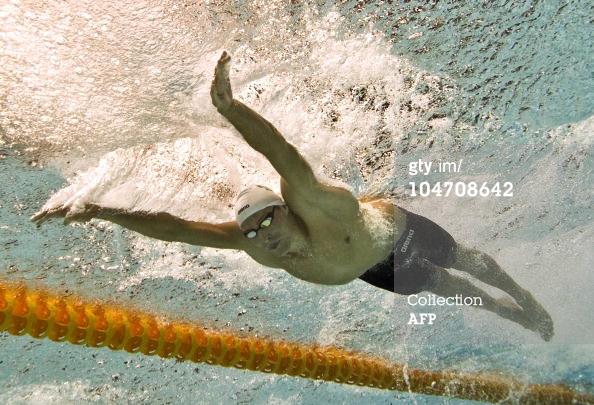
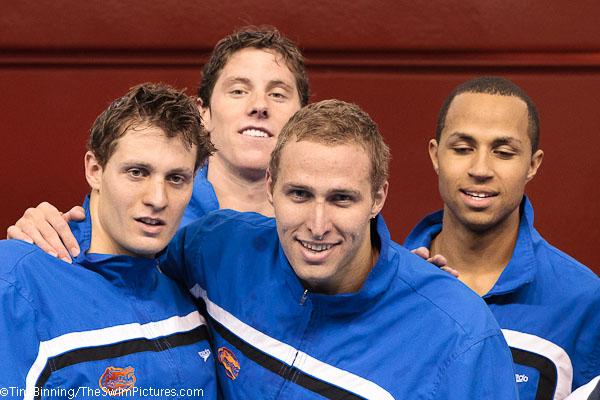
Sebastien Rousseau Florida wins the 800 free relay at the 2011 SEC Swimming and Diving Championships.
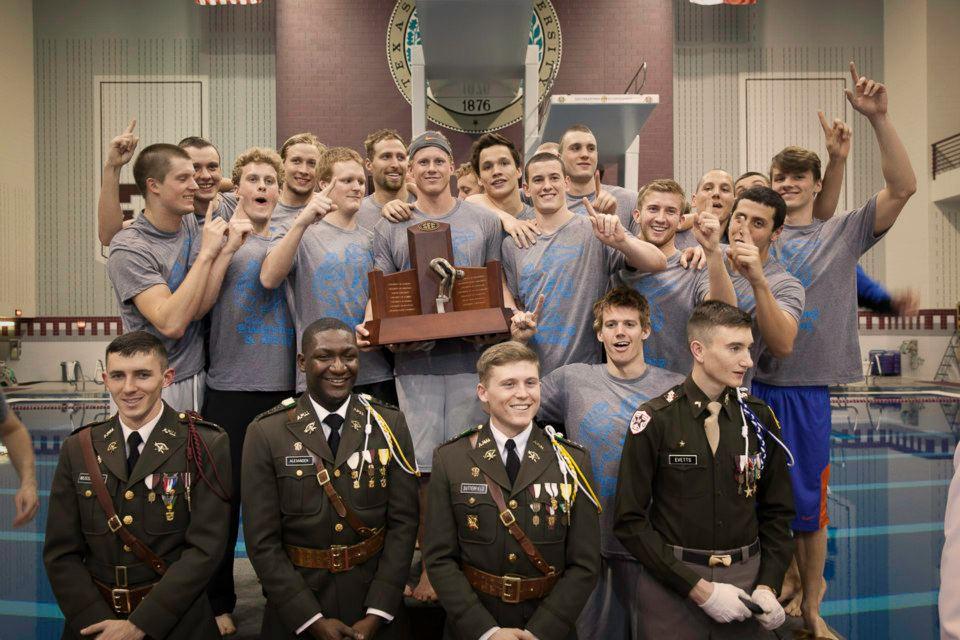
UP-CLOSE WITH SEBASTIEN ROUSSEAU
June 27, 2015
Today we are honoured to connect Up-Close with Sebastien Rousseau, one of SA’s finest exports, highly acclaimed for his performances in the swimming arena in and out of SA. He is currently living in the USA but proudly swims for SA at international meets.
Sebastien started dreaming big as a youngster of 8 years old when he told his dad that he wanted to compete in the Olympics one day. Destined and determined these words ended up exactly what he got! He is a 2x Olympic Champion, who was the youngest member on the team in the 2008 Beijing Olympics, being a month shy of his 18th birthday at that time. He did brilliantly and went on to represent SA at the London Olympics 2012. Now his mind is firmly set on the Rio Olympics 2016. He is humbled each time “to wear the special SA cap with our flag and to swim for the people of South Africa”.

Since young Sebastien has been an SA and African record breaker. This shining young champion has taken centre stage for medals at many top world-class meets representing SA at World Champs, Commonwealth Games and others. He holds the Mail & Guardian’s prestigious title of 200 Young South Africans. This they award to the few who are “young, courageous, optimistic, and brimming with talent”. In the US he has become a swimming force to be reckoned with. He has done brilliantly on the collegiate swimming circuit in the US, and has earned the honorary title of “All-American”. He accredits his many victories to his dedicated couches – Gregg Troy (USA) and Graham Hill (RSA).
The words that come to mind when I think of Sebastien is “joyful sacrifice”. For a youngster to leave behind his precious family, friends and homeland to go and pursue his dreams show great character and strength in a man. I could see from the interview below that he has such a deep compassion and genuine love for SA and her people. Sometimes this wonderful “switch” within us is only turned on when we step out of our borders and experience the world at large.

INTERVIEW:
You are admired all around the world for your swimming achievements. How did Sebastien Rousseau start out in swimming, and how did he become such a SA Swimming brand and household name?
Swimming was just the sport that came to me most naturally, I have always felt peaceful being in the water. I played all the usual sports when I was growing up, but when I realized I could make a big push in swimming I had to give up those other sports and focus entirely on my swimming. The successes that I have had in swimming are due to the countless hours that I have put into the sport. No success comes without hard work, and I pride myself on being a dedicated athlete. I also have a great love for swimming which makes it a lot easier for me to go in every day and train for all those hours. It also helps that I hate to lose, which also drives me to push myself past any ‘boundaries’.
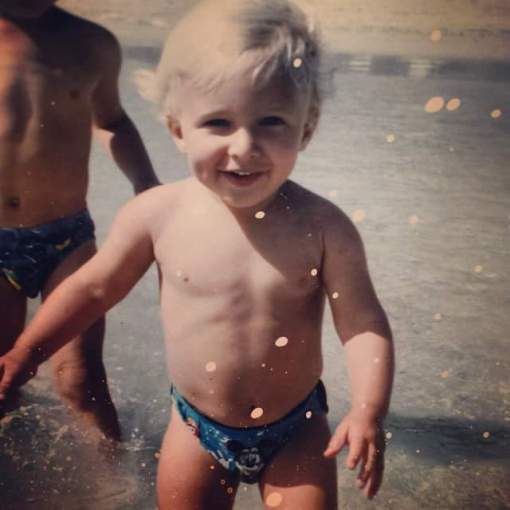
You are an Olympian, when you swam for your country, what did it feel like?
It was, and continues to be an amazing feeling. This is something I dreamt of as a young child, and now to be living my dream is better than anything I could have asked for. There is a huge sense of pride when you get to represent the people of South Africa, especially when you see the flag on your swimming cap before you go out to race.
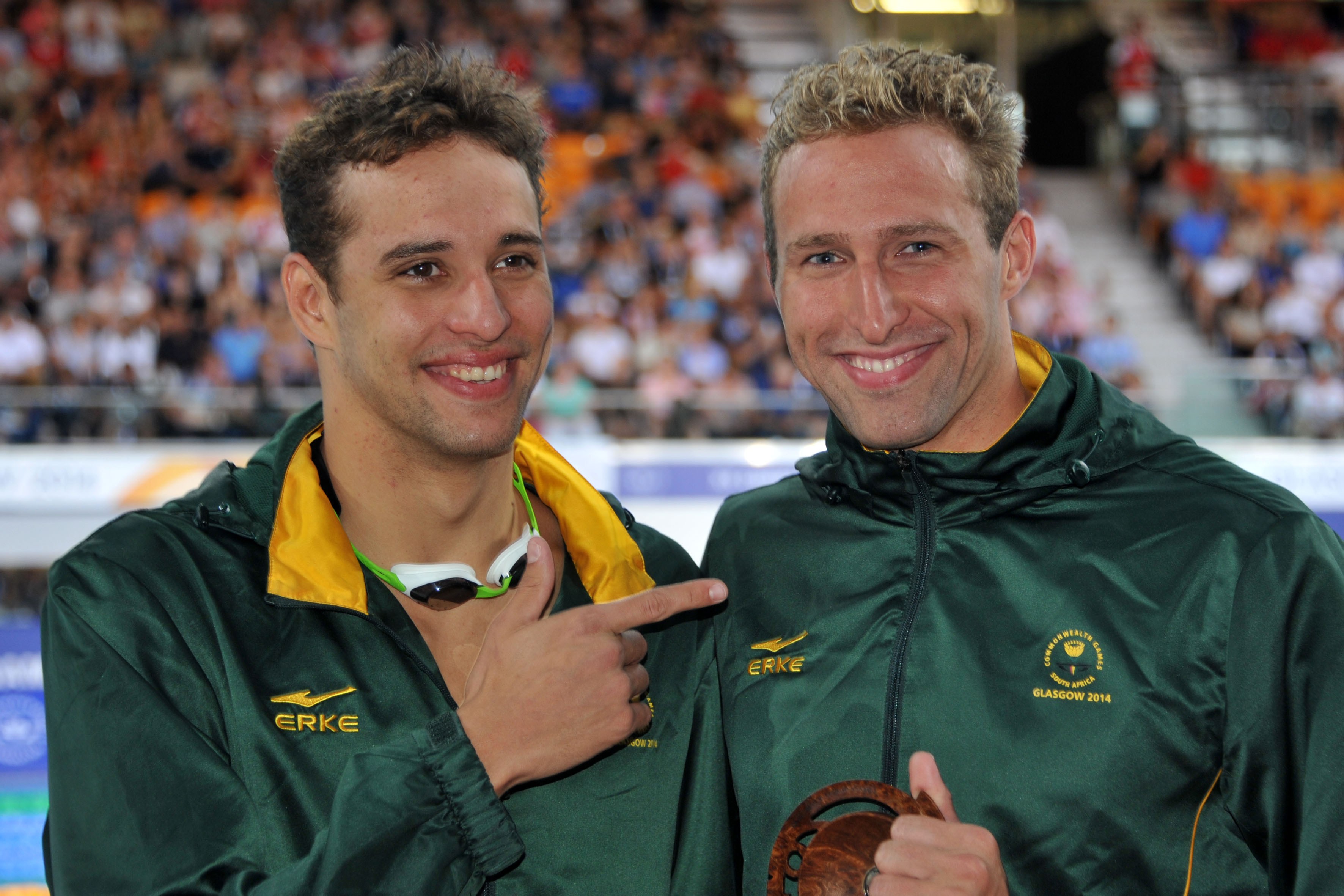
GLASGOW, SCOTLAND. 26 July 2014. Commonwealth Games, swimming Day Three. Chad le Clos, gold medal and Sebastion Rousseau, bronze medal in the 100m fly.
You currently live in the US and graduated in Sports Management in 2014 – how did you experience that and what about SA did you miss the most?
It was a very exciting but also challenging experience, and one that I will always cherish because it has taught me so much about myself as a person, and an athlete. The people here at the University of Florida are now family to me. I have a great relationship with the coaches, which has made the experience truly amazing. I have also made friends with people from all over the world due to athletes coming from other countries to UF, and that has been invaluable to create memories with these people I now consider family. However in saying that, the aspect of SA that I miss the most is definitely my family. My family made many sacrifices for me to get to where I am today, and I know that without them I wouldn’t have reached my goals. Whenever I am home, I make sure to cherish my time with them as my family is important to me. I also miss the SA food, especially braais. Being from Cape Town, I also miss the countless beautiful beaches that we have within a 15-minute drive.
Do you have any specific regimens or rituals in swimming? Maybe a particular diet/training method that can be partially attributed to your success?
I think the lessons that I learnt as a young swimmer, swimming with some much older swimmers, in how you can push your body despite what your mind might want to tell you when you are tired, have played the biggest roles in my success. My coach takes care of the training program and I trust him fully with that and I just come to practice looking to take on the challenge of whatever workout he might have planned for me.
How did you manage to fit in both sports and academics into your schedule?
While I was still studying, it could get pretty hectic managing it all. However, we have a great structure here at the University of Florida to help athletes achieve in the classroom, which was a huge benefit to me. We were provided with tutors whenever we needed them and we had an academic advisor, who helped tremendously with the putting together of our schedules. Right now, I am solely focussed on my swimming, since I graduated in December 2014.
Besides your swimming what do you have a passion for?
I definitely have a passion for most sports, especially rugby which I had to give up once my swimming got serious. I still watch as much rugby as I can with the help of live-streaming sports websites. I also have a huge passion for travelling. Through swimming, I have been fortunate enough to travel the world and experience so many different cultures which I love. I want to continue travelling throughout my life and see as much of the world as I can.
Which athlete/ athletes inspire you?
The Awesome Foursome – Ryk Neethling, Roland Schoeman, Darian Townsend, Lyndon Ferns – who won gold in the 4x100m Freestyle Relay at the Athens 2004 Olympic Games. These guys proved to me at a young age that South African swimmers could go and compete with the best in the world and come out victorious!
Read the full article here
